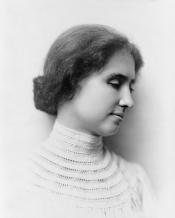Women's History Month began in 1987 through an act of Congress. Every March, celebrations across the United States recognize and uplift the stories and contributions of women. These women are historic figures and trailblazers in their communities. We've selected a handful of women throughout the over 240 years of United States history to highlight. Read on to discover more about these impressive women of their time who broke barriers and continue to inspire us today.
Phillis Wheatley (1753-1784), the first African American to publish a book of poems. Phillis Wheatley was kidnapped when she was seven years old from her home in Senegal and trafficked into slavery and enslaved by the Wheatley family. Phillis was enslaved to do household chores and was taught how to read and to write. Her first poem was published at the age of thirteen. One hundred years before the American Civil War, Phillis' poems utilized classical allusions and Biblical references that the majority of Americans believed Blacks to be incapable of. Her writing was subtly anti-slavery, political, and moral in a way that gave her international acclamation. Discover
our collection on Phillis Wheatley.
Maria Mitchell (1818-1889), America's first female scientist. She was a Quaker and an astronomer who learned the science from her father. She worked as a librarian and handled calculations for the U.S. Coast Survey and the U.S. Nautical Almanac. During that time, she witnessed a never before seen comet with her father's telescope. The discovery launched her scientific career that eventually led to her placement as the first female professor of astronomy in the United States at Vassar College. Read
our collection on her ground-breaking life.
Helen Keller (1880 - 1968), renowned disability rights activist. Helen Keller is well-known for overcoming deafness and blindness to live independently, but she was also a fierce activist for human rights. She was a founding member of the American Civil Liberties Union, a women's suffrage supporter, a staunch activist for workers' rights, and produced many writings and speeches on economic equality in the United States, including writings on the relationship between disability and poverty. Learn more about her from
our collection.
Sonia Sotomayor (1954 - Present), first Hispanic and Latina on the U.S. Supreme Court. Sotomayor grew up in public housing in the Bronx, New York. As the child of a factory worker and a nurse, she found solace in reading and credits this with her eventual path to law school. She graduated from Princeton University and Yale University before going on to the distinguished law career that led her to the U.S. Supreme Court. Check out
our collection on Sonia Sotomayor.
If you enjoyed this list, discover more books on women in history for all ages. Women's History Month is from March 1 through March 31.




